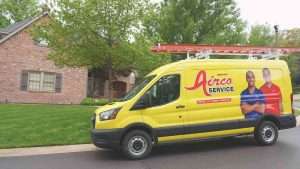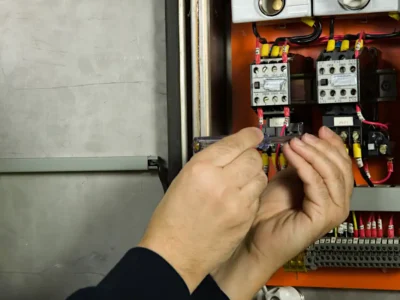Your home’s electrical panel works quietly behind the scenes, distributing power throughout your living space without much fanfare. Most homeowners rarely think about this critical component until something goes wrong or they notice their lights flickering unexpectedly. Understanding whether your electrical panel needs attention can help you maintain a safe, efficient home while avoiding unexpected issues down the road.
Understanding Your Home’s Electrical Panel
Think of your electrical panel as the heart of your home’s electrical system. This metal box, typically located in your basement, garage, or utility room, receives electricity from your utility company and distributes it throughout your house to power everything from your refrigerator to your smartphone charger. Inside the panel, you’ll find circuit breakers or fuses that act as safety gatekeepers, controlling the flow of electricity to different areas of your home.
Over time, like any component of your house, electrical panels can become less suitable for modern living demands. Homes built decades ago were designed for a different era, one with fewer electronic devices, smaller appliances, and different power requirements. As our lifestyle evolves and technology advances, the electrical infrastructure that once seemed perfectly adequate may struggle to keep pace.
Signs That Your Panel Might Need Attention
Recognizing the warning signs of an aging or inadequate electrical panel doesn’t require technical expertise. Your home often communicates these issues through everyday experiences that might seem minor but deserve consideration.
Frequent Circuit Breaker Trips
When circuit breakers trip occasionally, they’re doing their job by protecting your home from electrical overload. However, if you find yourself regularly resetting breakers or if certain circuits trip whenever you use specific appliances together, your panel might be signaling that it’s working harder than it should. This pattern often indicates that your electrical demands have outgrown your panel’s capacity.
Dimming or Flickering Lights
Walking into a room and noticing your lights dim when the air conditioner kicks on or when you start the microwave can feel unsettling. While this doesn’t always point to a panel issue, persistent dimming or flickering suggests your electrical system is struggling to distribute power effectively across your home’s various needs.
Warm or Discolored Panel
Your electrical panel should remain cool to the touch during normal operation. If you notice the panel feels warm, see any discoloration around the breakers, detect unusual odors, or hear buzzing sounds, these sensory cues warrant professional evaluation. These signs can indicate connections that aren’t working as they should or components experiencing stress.
Reliance on Extension Cords and Power Strips
Take a moment to count how many power strips and extension cords you use regularly throughout your home. If you’ve essentially created a secondary power distribution system because you don’t have enough outlets, or if your outlets can’t handle your devices, this workaround approach often masks an underlying capacity issue with your electrical system.
The Evolution of Home Electrical Needs
Understanding how home electricity usage has changed helps explain why older panels sometimes struggle with modern demands. Decades ago, a typical household might have had a television, a radio, a refrigerator, and basic lighting. Fast forward to today, and the average home powers multiple computers, smartphones, tablets, smart home devices, large-screen televisions, gaming systems, electric vehicle chargers, and increasingly powerful heating and cooling systems.
This evolution extends beyond just adding more devices. Modern appliances often draw more power than their predecessors, even when they’re designed to be energy efficient. Your home’s electrical infrastructure needs to accommodate these changing demands safely and reliably. An electrical panel that worked perfectly for a home’s original design might find itself stretched thin by contemporary usage patterns.
Different Types of Electrical Panels
Electrical panels have evolved significantly over the decades, and understanding what type you have can provide insight into whether an upgrade might benefit your home. Older homes might still have fuse boxes, which use fuses that burn out and need replacement rather than circuit breakers that can be reset. While fuse boxes can still function, they were designed for much lower electrical demands than modern homes typically require.
Some homes have panels from manufacturers that are no longer in business or have panels that have been identified by industry professionals as potentially problematic. Federal Pacific Electric panels and certain Zinsco panels, for example, have received attention over the years due to concerns about their performance. If your home has one of these panels, having a professional assessment can help you understand your options.
Modern circuit breaker panels offer improved safety features and greater capacity for handling today’s electrical loads. They’re designed with contemporary building codes and safety standards in mind, providing enhanced protection for your home and family.
Safety Considerations for Aging Panels
The relationship between electrical panel age and home safety deserves thoughtful consideration. As panels age, connections can become loose, components can wear down, and the overall reliability of the system can gradually decline. This natural aging process doesn’t necessarily mean immediate danger, but it does mean that staying aware of your panel’s condition becomes increasingly important.
Electrical systems contribute to home safety in ways we often take for granted. A properly functioning panel helps prevent electrical fires by shutting off power when circuits become overloaded. It protects your valuable electronics and appliances from power surges. It ensures that the electricity flowing through your walls remains safely contained and controlled. When a panel begins to show its age, these protective functions may not work as effectively as they once did.
Modern Upgrade Options
Today’s electrical panels offer capabilities that older systems simply couldn’t provide. Contemporary panels can handle significantly higher electrical loads, accommodating everything from home offices to electric vehicle charging stations. They incorporate modern safety features that provide additional layers of protection for your home and family.
Upgrading an electrical panel isn’t just about replacing old equipment with new equipment. It’s an opportunity to reimagine your home’s electrical capacity for both current needs and future possibilities. Whether you’re planning to add solar panels, install a hot tub, finish your basement, or simply want the peace of mind that comes with knowing your electrical system can handle whatever you plug in, a modern panel provides that foundation.
The upgrade process involves working with licensed professionals who understand local building codes and regulations. Different states have varying licensing requirements for electrical work, ensuring that professionals meet specific standards of training and expertise. This regulatory framework exists to protect homeowners and ensure that electrical work meets safety standards.
Planning for an Electrical Panel Assessment
If you’re wondering whether your electrical panel might benefit from professional attention, scheduling an assessment provides clarity. During an assessment, a licensed electrician can evaluate your current panel’s condition, examine your home’s overall electrical system, discuss your household’s power usage patterns, and help you understand whether your existing setup meets your needs.
This assessment doesn’t commit you to any immediate action. Instead, it provides information that empowers you to make informed decisions about your home’s electrical infrastructure. You’ll gain insight into your panel’s current state, understand any limitations it might have, and learn about options for addressing any concerns.
Think of this assessment as similar to other home maintenance checkups you might schedule regularly. Just as you have your heating and cooling system serviced or your plumbing inspected, having your electrical panel evaluated periodically makes sense as part of responsible home ownership.
The Value of Professional Expertise
Electrical work requires specialized knowledge, proper tools, and adherence to detailed safety protocols and building codes. This isn’t an area where well-meaning DIY approaches serve homeowners well. Licensed electricians bring training and experience that ensure work is completed safely, correctly, and in compliance with regulations.
When you work with qualified professionals, you benefit from their ability to spot issues that might not be obvious to untrained eyes, their knowledge of current best practices and code requirements, their access to quality materials and equipment, and their capacity to complete work efficiently while maintaining safety standards.
Professional electricians carry appropriate licensing for their state and maintain insurance coverage that protects both them and homeowners. They stay current with evolving electrical codes and understand how to navigate the permit and inspection processes that ensure electrical work meets official standards.
Making Informed Decisions About Your Home
Your home represents a significant investment, and decisions about maintaining and improving it deserve careful consideration. When it comes to your electrical panel, understanding its current state and future capability helps you make choices that support your home’s value, your family’s safety, and your daily comfort.
An outdated electrical panel doesn’t necessarily mean you’re facing an emergency. However, awareness of potential issues allows you to address them proactively rather than reactively. This approach gives you more control over timing and budgeting while ensuring your home’s electrical system continues serving your needs reliably.
Your home’s electrical panel plays a vital role in your daily life, even if you rarely think about it. Recognizing signs that your panel might be showing its age, understanding how household electrical needs have evolved, and knowing when to seek professional assessment all contribute to maintaining a safe, functional home. Whether your panel dates back decades or just needs evaluation to ensure it meets current demands, taking time to understand its condition empowers you to make informed decisions about your home’s electrical infrastructure. If you’ve noticed any of the signs discussed in this article or simply want peace of mind about your electrical system’s condition, we encourage you to connect with our team for a professional assessment tailored to your home’s specific needs.
Frequently Asked Questions
How long does an electrical panel typically last in a home?
While panels can continue functioning for many decades, their suitability for modern homes depends on various factors beyond just age. Manufacturing quality, installation workmanship, environmental conditions in the installation location, and how heavily the panel has been used throughout its life all influence its longevity. Some panels from certain eras or manufacturers may warrant earlier evaluation than others, regardless of their apparent functionality. The most reliable way to determine whether your specific panel remains appropriate for your home involves having a licensed professional examine it in person and assess how well it matches your current and anticipated electrical needs.
Can I add more circuits to my existing electrical panel if I need additional capacity?
The ability to add circuits depends on several factors unique to your situation. Your panel needs available physical space for additional breakers, and more importantly, it must have sufficient overall capacity to handle additional electrical load. Adding breakers to a panel that’s already working at or near its capacity doesn’t solve the underlying issue and can actually create new concerns. During a professional assessment, an electrician can measure your current electrical usage, evaluate your panel’s total capacity, and help you understand whether adding circuits makes sense or whether a different approach would better serve your needs.
Will homeowner’s insurance cover electrical panel replacement if problems are discovered?
Insurance coverage for electrical panel work varies significantly based on your specific policy, the reason for replacement, and the circumstances of discovery. Insurance typically covers sudden, unexpected damage, but may not cover upgrades or replacements needed due to normal aging or wear. Some insurance companies have begun requiring panel inspections or upgrades for homes with certain types of older panels as a condition of coverage or renewal. The best approach involves reviewing your specific policy with your insurance provider and discussing any concerns about your electrical panel directly with them to understand what coverage, if any, might apply to your situation.
What should I do if I’m buying a home and the inspection reveals concerns about the electrical panel?
Electrical panel concerns discovered during a home inspection provide an opportunity for informed decision-making rather than an automatic deal-breaker. You might negotiate with the seller to have the panel addressed before closing, request a credit toward panel replacement, or factor the cost of electrical work into your overall evaluation of the home’s value. Having a licensed electrician provide a detailed assessment and cost estimate gives you concrete information to work with during negotiations. Many homebuyers successfully navigate panel concerns by gathering complete information and working collaboratively with sellers to reach mutually acceptable solutions.



 Choosing the Right Water Filtration System for Your Home
Choosing the Right Water Filtration System for Your Home